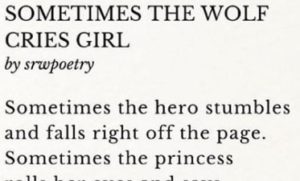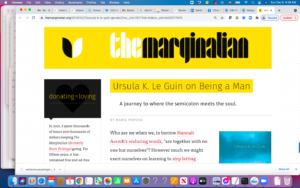The Power of “Sometimes” in our Framing

Recently, I posted this poem on Facebook:
A cynical friend responded, “Sometimes…none of this is true.” And I replied,
But all of it is, sometimes. Sometimes is the anchor word here, that allows us to play with our perceptions. All of it is true once in a while, but all of it is not true often enough that the inability to go there feels normative to you. As someone who has spent some big chunks of my life on the margins for various reasons, I can assure you that the narrow, normative, conformist version of reality isn’t real for a big percentage of the population—but who’s in and who’s out might vary over time.
My “margins” experience is both direct and indirect. Directly, I’ve been treated as marginal—”othered”—for living in poverty in my younger years…for not being into sports, hypermasculinity, or TV celebrity culture…for being Jewish…for being bisexual…for being a Northerner in Georgia and an Easterner in Southwest Ohio…And I’ve confronted ageism against both the young and the old—which started when I was very young and has continued now that people are beginning to think of me as old.
But I’ve also worked with a lot of groups that were marginalized in ways outside of my own direct experience of it. In college in the 1970s—long before same-sex couples were socially acceptable—I ran the campus Gay Center and started two more in cities where I had college co-op jobs and went to my first same-sex wedding in 1978 or ’79. I did community organizing around the environment and safe energy all the way back to 1971, when I was a 14-year-old high school junior—and that consciousness didn’t really become mainstream until THIS century. I worked as a paid organizer for an elders’ rights organization at 22 and 23. I had my consciousness raised about a whole bunch of disability rights and minority rights issues during the six years in the 1990s when I served on my city’s official disability access committee (helping public spaces like theaters and restaurants meet accessibility codes) and simultaneously on the District Attorney’s Civil Rights Advisory Board (sensitizing lawyers, cops, and criminal justice workers to the needs of marginalized communities). I worked for 15 years in that city and 24 years in the neighboring small town where I live now on opening up the electoral process and city/town government to disenfranchised voices. And for more than three years, I’ve been deeply involved with immigration/refugee justice work, including an extended visit to the US-Mexico border where we visited a huge refugee camp daily and heard the stories of some of the most marginalized people in the world.
This diversity of experience may seem very random—but certain common threads hold it all together into a larger whole that feels coherent and meaningful to me. A few examples:
- All of this work is about empowering people who have felt powerless
- All of it embraces the same construct that the poet presents: that just because something is a certain way doesn’t at all mean it’s impossible to change it (I even did a TEDx talk on this called “‘Impossible’ Is A Dare” (it’s 15 minutes long, riffs on a quote by Muhammad Ali that I misattributed at the time, and discusses how socially and environmentally conscious businesses can change the world—to watch, click the link and then click again on “event videos”)
- All of it works on the theory that change happens faster and more fully when it becomes a movement—while acknowledging that acting alone can still make a significant difference. (I’m very proud of my one-person, three-day demonstration against the US bombing of Libya that drew middle fingers and jeers on the first day, but supportive honks and waves on the third day, as well as many individual conversations with people who thought differently, sometimes reaching common ground and always de-demonizing each other—but I’m even prouder of the broad-based movement I founded that saved an endangered local mountain.)
- It all recognizes that change happens both internally, inside your own heart and brain, and externally, as the actions of one person or a movement ripple out into the wider world–and as these movements find common ground and begin to work together, discovering their intersectionality: their common struggle.
- As these movements begin to combine like an amoeba merging with its neighbor, it becomes easier to achieve drastic restructuring of society as people begin to look at solutions to our biggest problems as interrelated, holistic, and systemic.
So yes, we have the power to change ourselves and the world. As the poem says in its final lines,
just because it’s what we’ve been told
doesn’t make it true.

